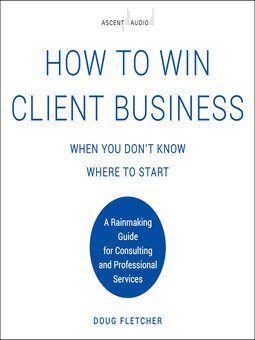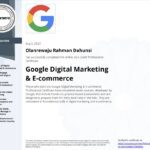In How to Win Client Business When You Don’t Know Where to Start: A Rainmaking Guide for Consulting and Professional Services, author Doug Fletcher provides a guide for selling professional and consulting services.
The Rainmaker
A rainmaker generally refers to a partner in a professional services firm who is skilled at bringing in client business. Rainmakers:
- Generate leads for new business
- Turn leads into new clients
- Are skilled at turning existing clients into referrals and repeat business
- Keep many people in their firms employed
- Are highly respected and frequently have a lot of influence in their firms
The Five Rainmaker Skills
Skill 1: Create Your Personal Brand Identity
Establishing our personal brand identity begins with deciding a) what we want to be known for and b) who we wish to serve. These two topics, our chosen field of expertise and our target audience, are the sharp end of the client development spear.
Skill 2: Demonstrate Your Professional Expertise
Clients need clues that we are really good at what we do.
“We’re comfortable spending $500,000 on a house after a short visit, but require months to choose an architect who will cost us a small fraction of this amount. Alternatively, we’ll spend $100,000 on a new Tesla Model S convertible after a 30-minute test drive, but struggle for months to choose a financial planner.”
The reason it’s easier to buy a house is that it is much easier to assess the quality of a “thing” than determine how happy we will be with a “service.” A product is used. A service is experienced. It’s the difference between what is and what could be.
Skill 3: Build Your Professional Ecosystem
It is often said in professional services that we are in the relationship business. Clients hire people with whom they have a relationship. Or, in the absence of knowing someone who can assist them, they rely heavily on “the advice of others. Our ability to win client business is based upon the quality of our professional network.
Skill 4: Develop Trust‐Based Relationships
Professional ecosystems flourish when the ties between its members are deepened by trust‐based relationships. This is the second phase of ecosystem building. Once established, relationships are strengthened by a commitment to helping one another succeed. Successful rainmakers value the people in their professional network, and dedicate time to helping these individuals succeed.
Real relationships are the key to winning client business, not a large advertising budget or digital marketing savvy. Helping others is at the heart of all human relationships, personal and professional. Real relationships are built upon respect and trust. Real relationships are built over time by being honest, helpful, and caring
Skill 5: Practice Everyday Success Habits”
Success at consistently winning client business comes from dedicating time every day to practicing the rainmaker skills. Practicing the rainmaker skills is not a sometimes thing; it’s something that successful rainmakers practice every day of the year. We’ll learn that success comes from building a personal client development system that works for you.
The Seven Elements of the Client’s Buying Decision Journey
Element 1: Awareness
A prospective client becomes aware of you. This could be someone you worked with years ago, someone you met at a conference, someone who read an article you wrote in a trade journal, or perhaps someone introduced to you at a friend’s holiday party. Whatever the case, your existence is known to a prospective client.
Element 2: Understanding
Once your existence is known, the prospective client needs to clearly understand what you do, who you serve, and how you are unique. It’s not enough to know that you exist. In order for others to hire you or recommend you to others, they need to be able to clearly articulate your area of expertise, who you serve, and what differentiates you from other service providers.
Element 3: Interest
Prospective clients have to be interested in what you do. They have to see that what you do could help them or, alternatively, help others they know. Interest lies at the intersection of your expertise and the problems of the world. Until someone is interested in the work that you do, they are simply friends, colleagues, or acquaintances. Your existence and expertise are filed away, but the client’s buying decision journey is far from over.
Element 4: Respect
Respect relates to your professional credibility. A prospective client, or someone who could potentially recommend you, has to believe that you are really good at what you do. Naturally, we wouldn’t want to hire someone who wasn’t good at what they do, or recommend someone to a friend if we didn’t believe they were highly skilled. Prospective clients and colleagues may struggle with this because it’s often hard to tell if we are really good at our profession. They look for clues – called credibility markers – to help them gauge our level of professional competence.
Element 5: Trust
Others must believe that you are a trustworthy individual if they would ever consider hiring you or recommending you to a friend. Are you honest? Are you ethical? Are you the kind of person that looks out for others’ interests, or are you self‐serving? Trust is the glue that holds the world together. It’s hard for others to see trust in our heart. Our trust is earned over time by doing things that demonstrate our character.
Element 6: Ability
Ability refers to a prospective client having the budget, decision authority, and organizational support to hire you. Without funding, we won’t be in a position to help an individual or organization, unless we’re doing pro bono work for a worthy cause.
Element 7: Readiness
As with many things in life, timing is everything. This is often the case with winning client business. Until your project or service has risen to the top of their priority list, the client isn’t ready to buy. Sometimes patience is the fastest way to get what you want. Being attuned to the client’s priorities will help us better understand when it’s the right time for us to help others.
Risks clients face:
- Competence risk: Are we really good at what we do?
- Culture risk: Are we a good cultural fit?
- Performance risk: Will we actually follow through on doing what we say we will?
- Integrity risk: Will we do what’s best for the client at all times?
- Reputational risk: Will this hurt my firm’s reputation if the project ends poorly?
- Financial Risk: Will this impact our firm’s financial performance if things don’t go well?
- Career risk: Will my career be derailed if this project goes badly?
The Seven Most Common Client Pathways
- Repeat business (from a satisfied client)
- Referrals (from a satisfied client, trusted colleague, friend, or acquaintance)
- Inquiries (from someone you know)
- Inquiries (from someone you don’t know)
- Warm prospecting (with someone you know)
- Warm prospecting (with an introduction)
- Cold prospecting (with no introduction)
You can do anything, but you can’t do everything.
Currency of the Trade: Respect and Trust
Respect and trust are the currency of our trades. You may be a strategist, litigator, auditor, or designer by profession, but at the end of the day we’re all in the relationship business. And the foundation of authentic relationships is respect and trust between those who need help and those who can provide help.
“Each of us has roughly 200 people who would make all the difference if we knew them. Not 2000 or 2 million – but 200. Having a close relationship with these 200 people could make our careers.”
The Mindshifts
- Mindset Shift One: Seeing ourselves as problem‐solvers instead of salespeople
- Mindset Shift Two: Viewing our professional accomplishments as credibility markers rather than bragging
- Mindset Shift Three: Thinking of our professional network as authentic relationships rather than names in a database
- Mindset Shift Four: Using our professional ecosystem to make new friends is highly appropriate when it’s based upon a genuine desire to help others
“Like kindness, referrals work best when they are given without asking.”
All the best in your quest to get better. Don’t Settle: Live with Passion.



Comments are closed.